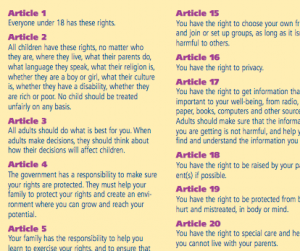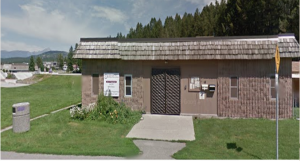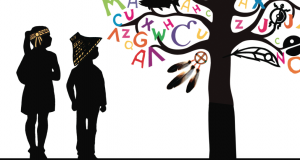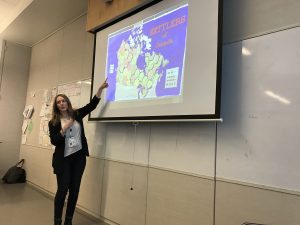The topics I explored in this module relevant to our course are decolonization, research and intellectual property. My research interest, traditional stories, connects to all these areas, and I was curious what practical resources related to these topics are available to storytellers and educators in the media age.
(1) This week! July 20-21, 2017: First Nations Language Conference, Vancouver
Stories are told best in their own language. What decolonizing language initiatives are out there? This week’s Language Learning on the Land conference presented by First Nations Education Steering Committee (FNESC) in Vancouver, BC might have some answers! Here is the summary:
The First Nations Education Steering Committee is pleased to present the First Nations Languages Conference, which is a major networking and professional development opportunity for BC’s school and community-based First Nations language educators and advocates. Together, we will explore the conference theme, Language Learning on the Land, and engage in workshops about First Nations languages teaching methods, assessment tools, advocacy, and technology.
The FNESC is a collective organization focused on “advancing quality education for all First Nations learners” that appears to be very active in organizing a vast array of initiatives, events and programs, such as the upcoming First Nations Language Teacher Mentor-Apprentice Program, Science First Peoples Workshop and Annual Aboriginal Education Conference.
(2) Authentic First Peoples Resources K-9
This resource deserves its own mention. The First Nations Education Steering Committee and First Nations Schools Association partnered up in 2011 to produce a publication of authentic materials. After an open call to Canadian publishers, BC educators developed an annotated list of resources. The guide defines authentic First Peoples texts and helps educators “make appropriate decisions about which of these resources might be appropriate for use with their students.” Updated in 2016, it asserts copyright under Canadian law. Within the document, it gives extended credit to authors, illustrators and contributors under each annotated listing, acknowledging communities and traditions. The free download is available here; printed copies may be ordered.
(3) Decolonizing Pedagogies
It seems appropriate as we move into our instructor’s readings, to cite one of Dr. McGregor’s relevant previous works. Decolonizing Pedagogies is a Teacher Reference Booklet prepared for the Aboriginal Focus School at the Vancouver School Board in March 2012. Fortunately for teachers in British Columbia and beyond, it still lives online. It is intended to explore:
What does “decolonizing pedagogies” mean? Why are decolonizing pedagogies important? What have educational scholars said about decolonizing pedagogies in Aboriginal education? How can decolonizing pedagogies be used in history education? What are the challenges of using decolonizing pedagogies?
What is the difference between revising content and pedagogy? As explained in the document:
Revising the content of education to better reflect Indigenous perspectives is often the focus of curricular reform. However, revising pedagogy used to produce and transmit Indigenous curriculum content can be equally important to effectively changing educational practice to make it more inclusive, holistic and reflective of Indigenous ways of teaching and learning.
A primary takeaway at the end of the document is to remember that decolonizing education is not only about integrating Indigenous content; it is about examining power relationships. The Resources list at the end provides further reading for examination.
(4) Social Sciences and Humanities Research Council (SSHRC) Aboriginal Research
How is research evolving and decolonizing in Canada to include Indigenous methodologies and perspectives? I looked at the Social Sciences and Humanities Research Council of Canada’s Aboriginal Research page to find out. Among many links, it lists tools to support applicants working in Aboriginal research, such as:
The page also links to resources for those involved in Aboriginal research, including: Royal Commission Report on Aboriginal Peoples, Final Report of the Truth and Reconciliation Commission of Canada, National Centre for Truth and Reconciliation, Universities Canada principles on Indigenous education, Indigenous Education Protocol for Colleges and Institutes, Federation for the Humanities and Social Sciences: Reconciliation and the Academy and Parks Canada Indigenous Affairs Branch.
SSHRC is active in current research funding, as evidence by its March 16, 2017 press release titled, “Government of Canada Invests in Indigenous Research Projects.” Watch this space!
(5) Law, Research and Working Papers on Intellectual Property (IP)
Here are a few sources I discovered related to IP and cultural appropriation:
(i) First, the Intellectual Property Issues in Cultural Heritage (IPinCH) project was a seven-year international research initiative based at Simon Fraser University (2008-2016) that explored “rights, values, and responsibilities of material culture, cultural knowledge and the practice of heritage research.” The project is a practical resource and a network of support for communities and researchers. IPinCH does not appear to have materials after 2016, but does contain excellent articles such as “The Appropriation of Aboriginal Cultural Heritage: Examining the Uses and Pitfalls of the Canadian Intellectual Property Regime” published in November 2015. This project was funded by the SSHRC.
(ii) Moving back in time, Indigenous Traditional Knowledge and Intellectual Property Rights is a paper published by the Parliamentary Research Branch of the Library of Parliament of Canada in 2004. It addresses:
- how Indigenous traditional knowledge differs from western science;
- why and how to protect traditional knowledge;
- limitations of the intellectual property rights regime; and
- international initiatives in protecting traditional knowledge.
(iii) Finally, for historical context, I discovered “Intellectual Property and Aboriginal People: A Working Paper” published by the Research and Analysis Directorate of the Department of Indian Affairs and Northern Development and the Intellectual Property Policy Directorate of Industry Canada in 1999. Almost 20 years on, it may not be a current legal resource, yet many of the fundamental principles remain, and such a document can provide a reference to understand how far we have (or have not) come in regards to IP law reform.
For current legal advice on IP matters, it is advisable to turn to Indigenous practices within law firms, and Indigenous law firms such as OKT, whose central philosophy is that “there will be no real justice until Indigenous peoples have control over their own fates and futures” and works for clients who want to use Canadian law as a means to help achieve this goal and achieve success on their terms.





